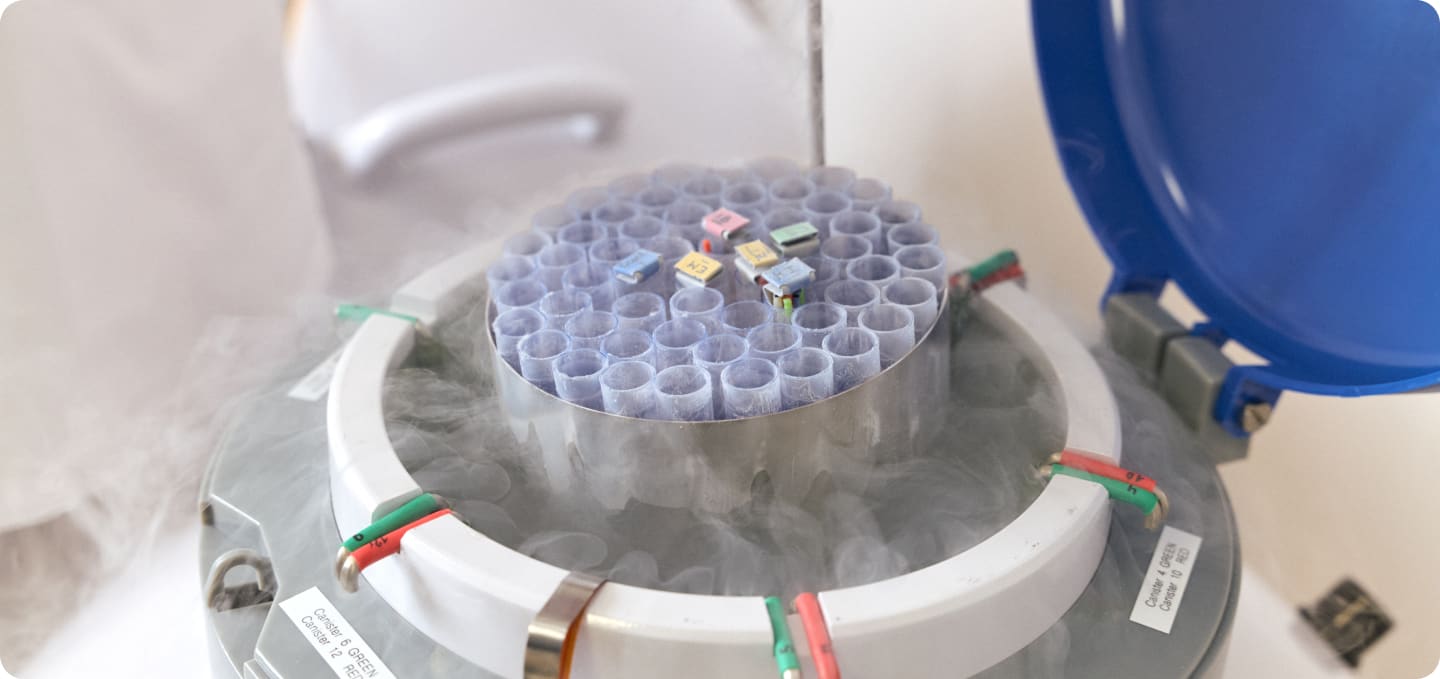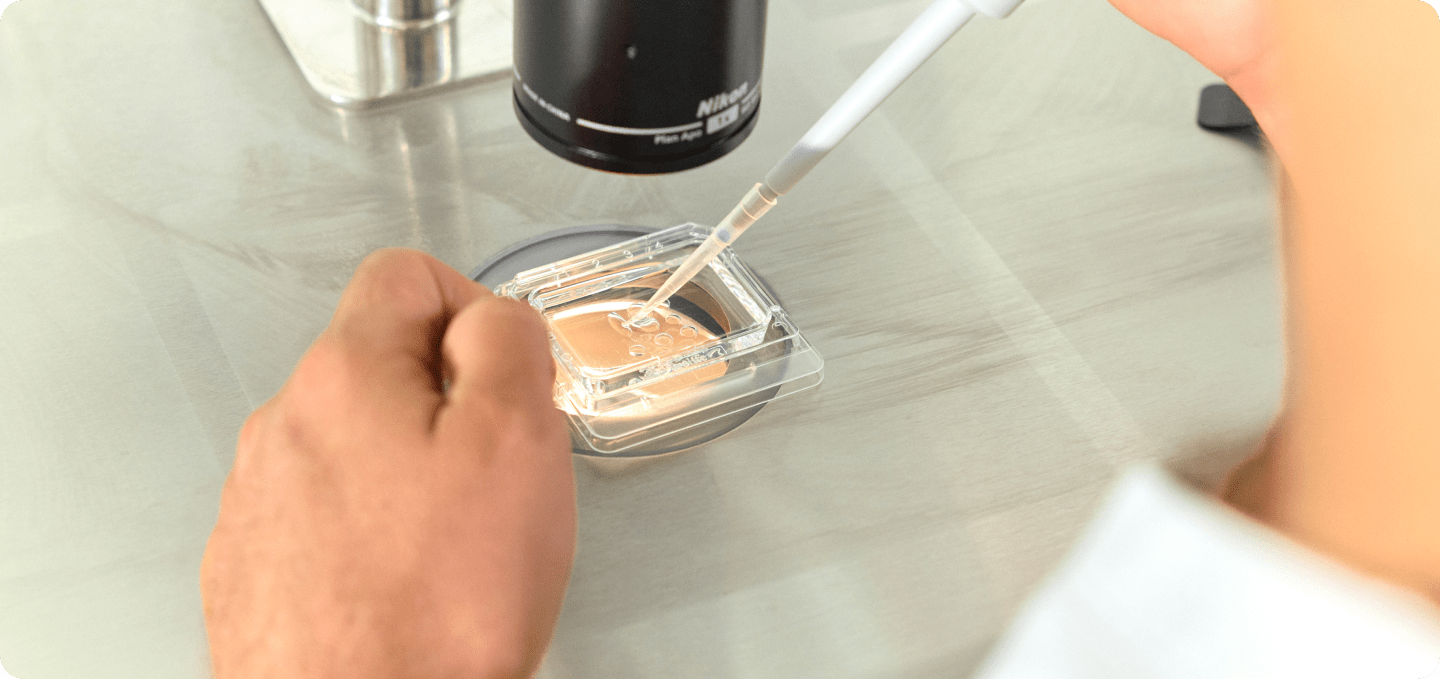Egg freezing is becoming increasingly popular. Learn how it can support your future plans and why many women choose to preserve their fertility.
Everything You Need to Know About Egg Freezing
- The most common reasons for social egg freezing are not having a suitable partner and wanting to postpone starting a family.
- When it comes to medical egg freezing, cancer is by far the most frequent reason, accounting for 78% of cases.
- Success rates largely depend on the woman’s age at the time of egg retrieval — the younger the woman, the higher the chances of a successful pregnancy.
- To maximise the likelihood of success, at least 8–10 eggs should be frozen, with 14–20 being ideal.
- In Switzerland, as in most countries, health insurance does not cover the costs of social egg freezing.
Preserving Fertility Through Egg Freezing
Whether due to a cancer diagnosis, an upcoming medical procedure, or simply the desire for more freedom in family planning — there are many reasons why egg freezing might be worth considering.
Young women who aren’t ready or able to have children yet often see social egg freezing as a way to preserve their fertility and avoid the age-related decline in egg quality, giving them the chance to conceive later using their own eggs.
Egg freezing can also be a vital option for medical reasons, such as preserving fertility before undergoing cancer treatment.
This article explores the most common motivations, success rates, and whether or not the costs are covered.

What Is Egg Cryopreservation?
Egg cryopreservation refers to the process of freezing unfertilised eggs. Mature eggs are retrieved from the ovarian follicles, frozen, and stored for potential use in a future pregnancy. This technique allows you to preserve your fertility, regardless of your current life circumstances or family plans.

Between 2022 and 2024, a study on egg freezing was carried out in France. Women who choose to freeze their eggs for personal reasons — known as social freezing — are on average 35 years old, more likely to be single (72.2%), and tend to live in urban areas.
Why Do Women Freeze Their Eggs?
In most cases, the timing simply isn’t right to start thinking about children. Common reasons include not having a partner or wanting to focus on career development. Even after five years, women can still use their frozen eggs.
– Dr Dirk Wallmeier, Doctor at Cada
Here’s an overview of the most common reasons for egg cryopreservation:
1. Career and Personal Goals
According to a recent study, the main reasons for social egg freezing are the absence of the right partner (64%) and the desire to have children later in life (22%). For most women (59%), these were the only reasons. A further 16% also said they wanted to focus on their careers before starting a family.
2. Medical Reasons
Certain medical treatments — such as chemotherapy — can have a negative impact on fertility. Freezing your eggs beforehand can help preserve your chances of having a child in the future.
A study using data from the US and Israel found that 78% of women who opted for medical egg freezing did so due to a cancer diagnosis. The most common types of cancer were:
- Breast cancer (43%)
- Blood cancers (leukaemia and lymphoma) (31%)
- Other forms of cancer (26%)
The remaining 22% froze their eggs due to other medical reasons, including:
- Severe endometriosis
- BRCA-positive genetic mutations
- Benign pituitary tumours
- Autoimmune diseases
3. Age-Related Decline in Fertility
A woman’s fertility naturally declines with age, especially after the age of 35, making it more difficult to conceive naturally. Freezing unfertilised eggs at a younger age allows you to preserve your fertility and safeguard the quality of your eggs. In essence, the biological clock is paused, giving you the option to build a reserve of healthy eggs for the future.
In a US-based survey exploring awareness of age-related fertility decline and attitudes towards social egg freezing:
- 86.7% of women believed the ideal age for freezing eggs was between 20 and 29.
- The percentage of women considering egg freezing increased with age, peaking at 41% in the 26–29 and 30–34 age groups.
- Women who believed the ideal age for having a first child was 35 or older were more likely to consider egg freezing.
How Successful Is Egg Freezing?
The success of egg freezing depends on several factors, including your age at the time of egg retrieval, the number of eggs collected and frozen, and the overall quality of the eggs. In general, the younger you are when you freeze your eggs, the better your chances of achieving a successful pregnancy later on.
A study involving 1,468 women who froze their eggs at an average age of 37.2 found a clinical pregnancy rate of 39.4% and a live birth rate of 27%.
Learn more about the next steps after egg freezing from Dr. Natalie Crawford:
Success Rates by Age
- Under 35:
Success rates are highest in this age group, as egg quality tends to be at its peak. According to one study, women who freeze their eggs before the age of 35 have a cumulative live birth rate of 74%. - Ages 35–37:
Success rates remain good but are slightly lower than in younger women. A study conducted by the NYU Langone Fertility Center analysed data from 543 women who froze their eggs between 2005 and 2020. The results showed that chances of success increased with the number of eggs frozen. Among women under 38 who froze more than 20 mature eggs, the cumulative success rate reached 70%. - Over 38:
Success rates decline significantly, as egg quality decreases with age. A meta-analysis of 10 studies involving 2,265 cycles from 1,805 patients confirmed that outcomes worsened as age increased, regardless of the freezing method used.
Despite this, live births were still achieved using slow-frozen eggs up to age 42, and using vitrified (flash-frozen) eggs up to age 44. The likelihood of a live birth was significantly higher with vitrified eggs compared to slow freezing.
How Many Eggs Should Be Frozen?
To ensure a reasonable chance of success, at least 8–10 oocytes should be frozen. Another study recommends aiming for 14–20 eggs to maximise the chances of a future pregnancy.

How Does Egg Freezing Work?
The egg freezing process involves several steps:
- Hormonal Stimulation:
You’ll receive hormone injections to stimulate your ovaries to produce multiple eggs. This treatment is essential to ensure that as many mature eggs as possible can be retrieved. - Egg Retrieval:
Once the follicles have developed, the eggs are collected under light sedation. During this procedure — known as egg retrieval — the follicles are punctured to extract the mature eggs. - Vitrification:
The eggs are flash-frozen using a process called vitrification and stored in liquid nitrogen at -196°C. - Storage:
Frozen eggs can be stored for many years until you’re ready to use them. When the time comes, the eggs are thawed and fertilised using sperm from your partner or a donor of your choice.
Egg Freezing and Fertility Treatment
When you decide to use your frozen eggs, fertilisation is carried out through in vitro fertilisation (IVF), usually in combination with intracytoplasmic sperm injection (ICSI). In this procedure, a single sperm is injected directly into the thawed egg using a fine needle.
Thanks to advances in this technique, success rates have improved significantly, with pregnancy rates of up to 40% per cycle now achievable.

Costs of Egg Freezing
The cost of egg freezing varies depending on the fertility clinic and your individual circumstances. In Switzerland, the overall cost typically ranges between CHF 5,000 and CHF 10,000 — this includes hormonal stimulation, egg retrieval, and the initial freezing and storage.
Ongoing storage fees are usually around CHF 300 to CHF 500 per year.
Financial Support
The level of financial support for social egg freezing varies widely from country to country. Israel is considered a pioneer in this area, covering the full cost of up to two cycles for women up to the age of 45. In contrast, the situation in Switzerland — as in most other countries — is quite different: here, the costs of social egg freezing are generally not covered by health insurance.
A key distinction is made between social freezing and medical freezing. Medical freezing is carried out for fertility preservation due to a medical condition — such as prior to cancer treatment — and is typically covered by health insurers. Social freezing, by contrast, is undertaken without a medical indication and is therefore usually self-funded.
Given the high cost of social egg freezing, financial support from employers is becoming increasingly important. A growing number of companies — especially in the United States, but also in parts of Europe — are now offering social egg freezing as a corporate benefit to female employees.
Takeaway: Why Freezing Your Eggs Could Be a Smart Choice
Egg freezing gives you the opportunity to preserve your fertility and keep the option of having children open for the future. Whether for professional, medical or personal reasons, freezing your eggs can be a sensible way to pause your biological clock and improve your chances of a successful pregnancy later in life.
If you're considering egg freezing, it's important to get informed and choose a fertility clinic you trust.
At our fertility clinic in Zurich, you’ll benefit from an experienced team and state-of-the-art technology to ensure your eggs are frozen safely and professionally.
Frequently Asked Questions About Social Egg Freezing
Does freezing affect egg quality?
No, freezing does not affect the quality of the eggs. A study showed that the duration of storage had no impact on survival rates after thawing, fertilisation rates, or pregnancy outcomes.
The eggs in the study were stored for periods ranging from 3 days to 8.2 years. The average survival rate after thawing was 90.2%, and the fertilisation rate remained around 70% across all storage time frames.
Long-term storage of eggs (over 4 years) had no effect on the likelihood of a clinical pregnancy or live birth.
Important: In Switzerland, unfertilised eggs may legally be stored for a maximum of 10 years.
What is the best age to freeze your eggs?
As a general rule, the younger you are when you freeze your eggs, the better the quality. Typically, frozen eggs should be used within ten years. The ideal age for social freezing is between 31 and 35, but depending on your personal fertility and overall health, it can still be a sensible option after that.
How do you choose the right fertility clinic for egg freezing
Choosing the right fertility clinic is key to successful egg freezing. Here are some important factors to consider:
- Experience and expertise: Look for a clinic with extensive experience in egg freezing and a strong focus on reproductive medicine and gynaecological endocrinology.
- Success rates: Ask about the clinic’s success rates, particularly in relation to the age of the patients.
- Personalised care: Compassionate, individualised support can make a big difference to how comfortable and confident you feel throughout the process. An initial consultation is a good opportunity to ask questions and address any concerns.
- Transparent pricing: Make sure the clinic provides clear, upfront information about costs, with no hidden fees.







